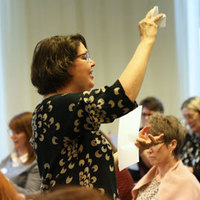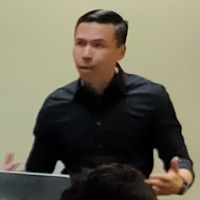Papers by Marika Tammeaid
Kasvun tuki -aikakauslehti, May 28, 2021
Kasvun tuki -aikakauslehti, May 28, 2021
SN Business & Economics
Global Encyclopedia of Public Administration, Public Policy, and Governance, 2020
As societal complexity deepens, public leadership meta-skills become ever more important. Leaders... more As societal complexity deepens, public leadership meta-skills become ever more important. Leadership meta-skills refer to generic leadership competencies (and skills) which are by nature both individual and representative of the collective capital of those in public administration leadership positions. Meta-skills are the essence of developing today’s public institution leaders since they constitute joint sensemaking, know-how, and competencies which cut across organizational boundaries within government, public institutions, and public organizations, ignoring the compartmentalized sectors and organizational silos within public administration.

Developing Public Sector Leadership
Complexity creates change challenges for public institutions, public policies, public administrat... more Complexity creates change challenges for public institutions, public policies, public administration and thus for public sector leadership. This chapter asks how to nurture and strengthen leadership development with the use of new and upgraded leadership tools and practices in this context? The public sector's role in society is constantly evolving. At the moment, governments are being transformed in the direction of a more active role for government. The narrative about the idea of an enabling state is that active government enables diverse development across society, including new innovations and the strengthening of the 'whole of government' agenda. This calls for a new rationale and development tools for public sector leadership. Service-based production and action logic calls for a more nuanced role for public administration to ensure better public service delivery and thus the betterment of society. In practical terms, public administration is challenged to take a more active part in fostering innovativeness in society through the deployment of various ecosystems and value-creating cooperatives. This chapter describes these challenges and the changes taking place at an accelerating pace and discusses how they affect public sector leadership and how public sector leadership development tools and practices should be adjusted accordingly. 3.1 The Complexity Conundrum and Nasty Red Tape Plagues The society around us is open, spontaneous and service-based. • By openness, we refer to citizens' and service users' opportunity to give voice and act. Technology development, especially the Internet and the digitalisation of

‘I cannot teach anybody anything. I can only make them think’ is a proverb from Socrates which is... more ‘I cannot teach anybody anything. I can only make them think’ is a proverb from Socrates which is also a very good motto for designing training for a VUCA-world. It is also something that is rather different from the traditional approach to leadership training which continues to support the rather naive idea that there is a knowledge-based solution to every problem, preferably provided by some researcher or external expert. The key issue in facing an unknown future and complex challenges is to realise that there are no ready or simple answers for how to think, or how to take action. From the perspective of learning, listening to lectures does not necessarily open new horizons for thought nor does it generate new kinds of action. In practice, solutions and real changes arise when knowledge, skills and experience are combined in a manner that is different from how this has been done before. This requires bringing knowledge to a personal level and the interactive building of understanding. It also calls for the taking of a step away from the temptation to draw quick conclusions from contradictory opinions or facts and seeing bewilderment as a fruitful condition. Long-term training provides an ideal platform to learn when it is designed in such a way that it develops the ability to think and seek solutions together. When the training is not delivered from an expert position, but instead as an open-ended dialogue with and between the participants, it also creates a great opportunity to practise all the important meta-skills discussed in Chap. 5. In this chapter, we describe in detail how the Route for Renewal© training programme (2016–2018) was designed and conducted in Finland by the Finnish Innovation Fund Sitra. The main aim of the leadership training was to precipitate a systemic change in terms of leadership for the 2020s within the Finnish Central Government. Eight specific learning activities are described in detail, as well as the solutions-focused paradigm of change and facilitation.

The role and approach of public sector leadership change rapidly because everything else is chang... more The role and approach of public sector leadership change rapidly because everything else is changing around it—public institutions, public organisations, users of public services and the role of the media. This ongoing change calls for new understanding as regards learning mechanisms in relation to public sector leadership, specifically, how and why it takes place. Pragmatist philosophy and complexity theory strongly affect public sector leadership. These conceptual entities offer a fresh way to understand how and why public sector leadership development takes place and why it has to take into account the wide range of criticisms targeted at ‘old-school’ New Public Management and its construction of rational, positivist and quantitative approaches of evidence-based accountability. Good leaders are good because they have developed themselves to be better human beings and better at leading people. To develop yourself as a leader is a conscious act, it is a ‘mindset’ thing, which poses...

This chapter discusses how public sector managers and leaders think about their work and their or... more This chapter discusses how public sector managers and leaders think about their work and their organisations and with what kind of mindset reformulation should be developed to adjust to the demands of a changing society. The ability to perceive our organisations will also define how we observe and develop them. These skills can be developed, but the process requires an ‘open-minded’ attitude, a realistic understanding of one’s personal strengths and weaknesses and the ability to see future possibilities from a new perspective. Broadening one’s mind-related diversity is essential for top-level public sector executives; how to do it, relates to leaders’ personal habits, preferences, and competencies. The contents of work, human resource management and competence building have changed markedly in recent decades. This relates to all types of organisations from business to public administration and further to the non-governmental sector. In the context of this chapter, cognitive ergonomi...

Developing Public Sector Leadership, 2020
As an anecdote and reference to George Lucas’ Star War movie saga, we might say that the bureaucr... more As an anecdote and reference to George Lucas’ Star War movie saga, we might say that the bureaucratic nature of public sector institutions and organisations has been an approaching (and to certain extent prevailing, immanent, though taking place step by step) ‘death star’ for generations, with major debates about time-consuming decision processes, corruptive behaviour mentality, bad service experience, old-fashioned and not-fit-for-purpose operational protocols—and good-for-nothing or next-to-nothing leadership. Leadership issues have not, however, been discussed in a detailed manner thus far—not least from the perspective of leadership development in the public sector. The good news is that this death star nightmare has perhaps finally come to an end. Not necessarily because of the Sitra leadership training programme, but because we foresee that public sector leadership and leadership development in particular will attract exponentially growing interest in the coming years.











Uploads
Papers by Marika Tammeaid